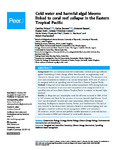Cold water and harmful algal blooms linked to coral reef collapse in the Eastern Tropical Pacific

Date
2022-09-28Author
Subject
Metadata
Show full item recordAbstract
Background: With conventional coral reef conservation methods proving ineffective against intensifying climate change, efforts have focussed on augmenting coral tolerance to warmer water—the primary driver of coral declines. We document coral cover and composition in relation to sea surface temperature (SST) over 25-years, of six marginal reefs in an upwelling area of Costa Rica’s Eastern Tropical Pacific. Methods: Using reef survey data and sea surface temperature (SST) dating back over 25-years, we document coral cover and composition of six marginal reefs in an upwelling area of Costa Rica’s Eastern Tropical Pacific in relation to thermal highs and lows. Results.: A ubiquitous and catastrophic coral die-off event occurred in 2009, driven by SST minima and likely by the presence of extreme harmful algal blooms. Coral cover was dramatically reduced and coral composition shifted from dominant branching Pocillopora to massive Pavona, Porites, and Gardineroseris. The lack of coral recovery in the decade since indicates a breach in ecosystem tipping-point and highlights a need for resilience-based management (RBM) and restoration. We propose a locally tailored and globally scalable approach to coral reef declines that is founded in RBM and informed by coral health dynamics.
Collections
Publisher
Place of Publication
Journal
Volume
Pagination
Number
Recommended, similar items
The following license files are associated with this item:

